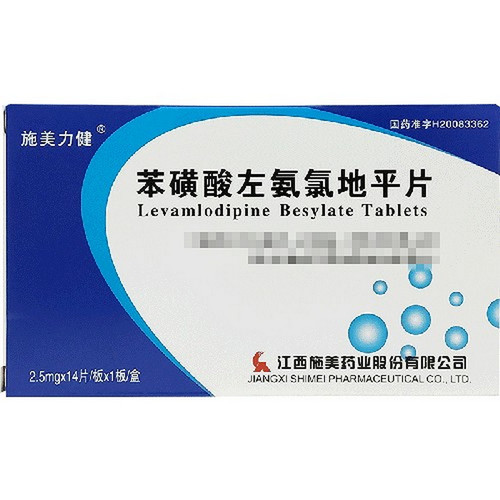Product Overview
[Drug Name]
Generic Name: Levamlodipine Besylate Tablets
Trade Name: Zuoyi
English Name: Levamlodipine Besylate Tablets
Chinese Pinyin: Benhuangsuan Zuoxuan'anlüdiping Pian
[Ingredients]
The main ingredient and its chemical name are: (-)3-ethyl-5-methyl-2-(2-aminoethoxymethyl)-4-(2-chlorophenyl)-1,4-dihydro-6-methyl-3,5-pyridinedicarboxylate benzenesulfonate
[Properties]
This product is a white tablet.
[Indications]
1. Hypertension (used alone or in combination with other medications)
2. Angina pectoris: especially spontaneous angina (used alone or in combination with other medications)
[Dosage and Administration]
The usual starting oral dose is 5 mg once daily, with a maximum of 10 mg once daily. For thin patients, those with frail constitutions, elderly patients, or those with impaired liver function, the dosage should be started at 2.5 mg once daily. Patients taking other antihypertensive medications should also start at this dose. The dosage should be adjusted based on individual needs, and the adjustment period should be at least 7-14 days to allow the physician to fully assess the patient's response to the dose. However, faster adjustment can be performed if clinically warranted. The recommended dose for the treatment of angina pectoris is 5-10 mg; elderly patients or those with impaired liver function may require a reduced dose.
[Adverse Reactions]
This drug is well tolerated by patients. 1. Less common side effects include headache, edema, fatigue, insomnia, nausea, abdominal pain, flushing, palpitations, and dizziness. 2. Extremely rare side effects include itching, rash, dyspnea, weakness, muscle cramps, and indigestion. 3. Similar to other calcium channel blockers, there have been rare reports of adverse reactions such as myocardial infarction and chest pain, and these reactions cannot be clearly distinguished from the patient's underlying medical condition. 4. No abnormal laboratory parameters have been found related to this drug.
[Contraindications]
Allergy to dihydropyridine calcium channel blockers.
[Precautions]
1. Angina and/or Myocardial Infarction: Rare. Patients with severe obstructive coronary artery disease may experience an increase in the frequency, duration, and/or severity of angina attacks, or the development of acute myocardial infarction, when initiating or increasing the dose of calcium channel blockers. The mechanism is unknown. 2. Hypotension: Due to the gradual vasodilatory effect of this drug, acute hypotension is generally rare with oral administration. However, caution is advised when this drug is used in combination with other peripheral vasodilators, especially in patients with severe aortic stenosis. 3. Patients with Heart Failure: Calcium channel blockers should be used with caution in patients with heart failure. 4. Patients with Hepatic Impairment: This drug should be used with caution in patients with severe hepatic insufficiency.
[Use in Special Populations]
Precautions in Pediatrics:
There are no data on the use of this drug in children.
Precautions during Pregnancy and Lactation:
This drug is recommended only when there are no safer alternatives or when the underlying medical condition poses a greater risk to the mother and child. Precautions for Elderly Patients:
Elderly patients can use the normal dose. However, it is advisable to start with a lower dose and then gradually increase it.
[Drug Interactions]
1. This product is safe to use in combination with the following medications: thiazide diuretics, beta-blockers, angiotensin-converting enzyme inhibitors, long-acting nitrates, sublingual nitroglycerin, nonsteroidal anti-inflammatory drugs, antibiotics, and oral hypoglycemic agents. 2. In healthy volunteers, coadministration of this product with digoxin did not alter digoxin plasma concentrations or renal clearance; coadministration of this product with cimetidine did not alter its pharmacokinetics. 3. In vitro data indicate that this product has no effect on the plasma protein binding of digoxin, phenytoin, warfarin, or indomethacin. 4. In healthy male volunteers, coadministration of this product with warfarin did not affect warfarin's changes in prothrombin time. [Pharmacological Action] Amlodipine besylate is a dihydropyridine calcium antagonist (calcium ion antagonist or slow-channel blocker). Cardiac and smooth muscle contraction depends on the entry of extracellular calcium ions into cells through specific ion channels. This drug selectively inhibits the transmembrane entry of calcium ions into smooth muscle cells and cardiomyocytes, with a greater effect on smooth muscle than on myocardium. Its interaction with calcium channels is determined by the progressive rate of binding and dissociation between the drug and its receptor site, resulting in a gradual onset of pharmacological action. This drug is a peripheral arterial dilator, acting directly on vascular smooth muscle to reduce peripheral vascular resistance and, consequently, blood pressure. Negative inotropic effects have been observed in vitro at therapeutic doses, but not in whole animal studies. This drug does not affect plasma calcium concentrations. Its antihypertensive activity has been confirmed in 15 randomized, double-blind, placebo-controlled clinical trials.
[Storage] Store in a dark, tightly sealed container.
[Strength] 2.5 mg (as levamlodipine)
[Packaging] 14 tablets/box
[Expiry Date] 36 months. Approval Number: National Medicine Standard H20083460
Manufacturer: Zhejiang Anlikang Pharmaceutical Co., Ltd.








